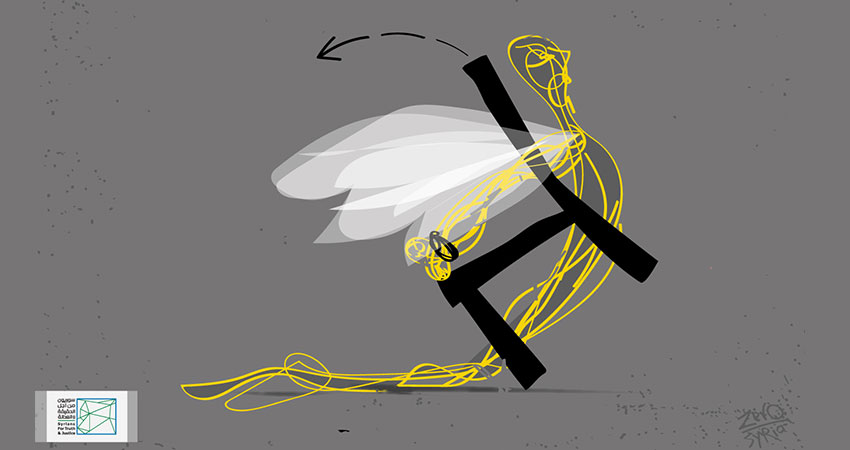Introduction:
“Death was ready for us every second,” thus survivor “Nizar al-Abdallah” described the period he spent in the Syrian security services’ detention facilities, which lasted for five bitter years. In January 2014, while yet a university student in the city of Aleppo, “Nizar” was arrested along with his friends, who were, then, moved from one security branch to another. However, the most horrific of all was the Air Force Intelligence Branch in the city of Aleppo, which “Nizar” remembers to the moment. There, in one of the branches’ tiny cells, he was held captive with other 130 detainees, especially on the day when the armed opposition groups announced launching a military operation to take over the Air Force Intelligence Branch in Aleppo city[1]. In this testimony, given in December 2018, “Nizar” recounts to Syrians for Truth and Justice/STJ, what he had to suffer:
“I was released after paying a sum of about 20 million Syrian Pounds to the administration of the Air Force Intelligence in the al-Mazzeh area. My family was coerced into selling all it once had. Even I was happy that I have been freed, losing my future and education, in addition to poverty that became my family and my dear companion after paying this huge sum of money, sorrow lay deep in my heart.”
1. Who Is Survivor “Nizar al-Abdallah”?
“Nizar al-Abdallah” is born in the city of Kafr Nabl, rural Idlib, in 1933, to a humble well-off family. As a child, “Nizar” lived with his parents and two younger brothers in a single room in Kafr Nabl city. When nine years old, his father promised to build the family a house. “Nizar” reminisced that it was in this house where he spent the happiest and most beautiful moments of his life even though its construction was not complete. “Nizar,” also had a vision problem as a student, which led to his underperformance as a student and forced him to wear glasses.
Since the break out of the Syrian conflict in 2011, Nizar’s family has been facing several difficulties; his fathers’ work came to a halt, and his education deteriorated once more. When the confrontations between the Syrian regular forces and the armed opposition groups began in 2012, as to control the city of Kafr Nabl, Nizar was preparing to take the final exams. Both power cuts and the sounds of shooting gave him a hard time. But still, he managed to survive the phase and passed the high school exams with good marks. His father insisted on sending him to Aleppo city to pursue a university education.
“Nizar” became a student at the “Mechanical Engineering Faculty” in Aleppo city, where he rented a house near the university along with a group of his friends. However, “Nizar” could not take the exams, for he was arrested by the Syrian security services early in 2014. From their house, “Nizar” and all his roommates were led to the detention facility on the claims of participating in the anti-Syrian regular forces protests in the city of Kafr Nabl. They kept telling the security services that they had exams in a few days, but one of the militants told them: “Do not worry, you would not miss a thing. It is a mere chit chat, and you will return.” Alas, this small talk took five years, which “Nizar” lived in bitterness to the smallest detail. He said:
“January the 26, 2014, was the day on which I had to meet my fate, detention, simply for being from the city of Kafr Nabl, which showed noticeable participation in the peaceful action since its beginning. My story began when the Air Force Intelligence in Aleppo city arrested one of my friends, two days before my own arrest. The reason for his arrest was the cellphone he used, for it was full of revolutionary chants and videos of the demonstrations that took over Syria. When my classmate was arrested, I was away at my family’s house in Kafr Nabl. I wanted to take a break before the exams. Interrogating my friend, beating and torturing him, they managed to obtain the address of the house where we lived near the university. The vacation at home ended, and I returned to university in Aleppo city, particularly to the house I shared with my friends. There were 10 of them, all from the city of Kafr Nabl. On the return’s day, I took the ‘Khanaser’ route, for the situation was unsafe and the confrontations between the opposition armed groups and the Syrian regime’s forces were ongoing. It was an eight-hour-journey, the way back. I arrived home and immediately was informed of the arrest of one of my university colleagues by the Air Force Intelligence. I was stricken with sorrow for him and was full of shock, for I never imagined that they would go that far, where they arrest university students in such a manner and for no solid reasons. I tried to maintain a hold of myself, but could not prevent the tears I shed sad for the conditions we were stuck in and remembering the young man who accompanied me since boyhood and the very first years of school. I arranged my stuff in the room, changed my clothes and sat to have lunch with my friends. Our hearts ached for the arrest of our friend. Only a few moments passed when we heard a car pulling over outside the house, and then there was a hard knock on the door. We were surprised upon seeing the personnel of the Air Force Intelligence inside the house. We were taken aback and afraid. One of the militants, obviously with the highest rank, told us that you will all be our guests at the Air Force Intelligence Branch in al-Zahraa neighborhood, Aleppo. I could not believe my ears, for what crime are we being arrested, where to they are taking us and what destiny lies ahead of us. I summoned courage and dared to tell him that our exams are approaching, and we cannot leave the university now. Once I finished my words, somehow cynical, he answered me that it is a matter of a question and answer, and then you will get back to your study. However, the innocence of our hearts and their being filled with nothing but the love for education and the belief in the future awaiting us could not deliver us.”
2. “Dozens of University Students were Detained with Me”:
“Nizar” and his 10 friends were placed in a military car; the personnel drove them to the Air Force Intelligence Branch in the al-Zahraa neighborhood, Aleppo city. Arriving there, they were held in a small cell, where fear started to creep into their hearts, for no indicators could tell that their detention would be short. Two hours later, someone opened the door to the cell, and one of Nizar’s friends was dragged out without a single word. They were subjected to investigation one after the other. According to “Nizar,” they committed themselves to the same answer, that they are students at the “Mechanical Engineering Faculty” and that they had nothing to do with politics or militarization. They stressed that their goal was education and nothing more. “Nizar” added:
“An officer called ‘Maher Mahmoud’ supervised the process of interrogation. I remember that he had a towering voice and harsh face features. When I was led to the interrogation room, he started asking me about the relationship I had with the young man arrested before, who had a cellphone filled with some stuff they consider terrorism-related or something like that. My answer was that he is my colleague and one of my home city’s young men, nothing more. I also told him that I was on a visit to my city when the young man was arrested and knew nothing of the matter at the time. Then he started asking me about my relationship with those he called terrorists in the city of Kafr Nabl, and my answer was also that I never participated in the fighting, not even the demonstrations, adding that I was simply a university student. He started yelling, his voice filled the room, accusing me of lying and that ‘I am dealing with terrorists and I want to overthrow the President Bashar al-Assad.’ I tried to hide the fear that possessed me, so I could defend myself. I told him that he could ask everyone about me, and if he finds me guilty for lying I would be ready to bear the consequences. He pointed out to the guard at the door, who dragged me and returned me to the cell. The next day, in the morning, I was surprised with dozens of university students from Kafr Nabl, being arrested as well, along with the students from other areas. Our number amounted to about 130 persons, placed in various cells. We remained thus for three months, during which the exam time was due and we could not take it. In April 2014, a military operation outside the prison was being launched by the armed opposition groups, which tried to control the Air Force Intelligence Branch. The personnel brought the prisoners, 130 students, together and held them in the same room. It was extremely tight, and no one could seat, for the place was really narrow. Every one kept standing on two feet for more than 15 days.”
3. “Death was there, Just before Our Eyes”:
The detention period bore witness to the cruelest and harshest days in Nizar’s life, and his friends’, all of whom were university students; eight studying medicine and another studying plastic surgery. They looked death in the eye, every second they spent in the cell, for they were 130 detainees, held, standing up, in a single tiny room. They took turns to sleep, snuggling to create a space for each other to sleep. “Nizar” said:
“We could hear the sounds of the confrontations outside and the mortars being dropped from every direction. They were days, which no human being, I believe, could survive without extreme agony. It was doom. The air in the room was running out, for it contained only a small vent. The real suffering would be inflicted upon us when we tried to protest the situation, for they threatened to close the vent, which would have caused the death of everyone. The confrontations which the opposition armed groups participated in, seeking to control the Air Force Intelligence Branch, failed. The battle ended, and we resumed our former state, about 25 detainees in each cell. On May 1, 2014, we were transferred on board a helicopter to the Air Force Intelligence Branch in al-Mazzeh, Damascus. I was transported with 25 other detainees, the majority of whom were from Kafr Nabl city and university students. The transportation process took place at night, for we were taken out of the cell and our wrests were brutally kept together by plastic cuffs. They led us to the courtyard almost naked. It was the first time I see the Air Force Intelligence Branch from the outside after the confrontations. The sight was ghastly, destruction could be seen everywhere. We were immediately blindfolded and ordered on our knees in the severe cold. We waited for more than two hours before the helicopter came. They first loaded the dead bodies of many personnel and officers, who got killed in the confrontations. Then they forced us in with insults and beating. Throughout the journey to the Air Force Intelligence, they never stopped beating and insulting us after we noticed the massive number of their dead personnel.”
Satellite images featuring the Air Force Intelligence in Aleppo through time:
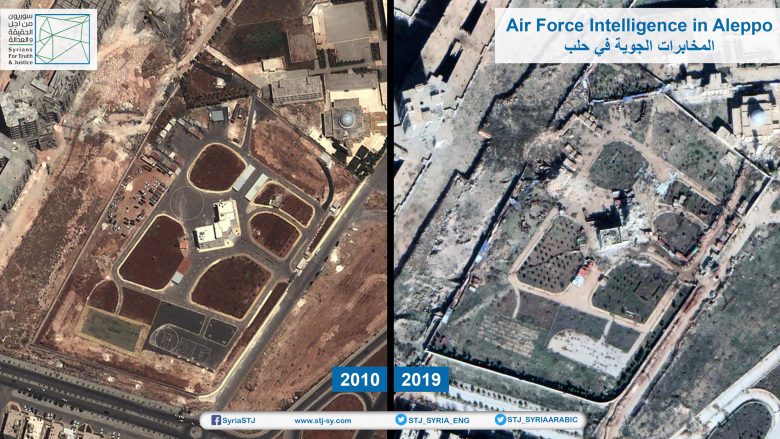
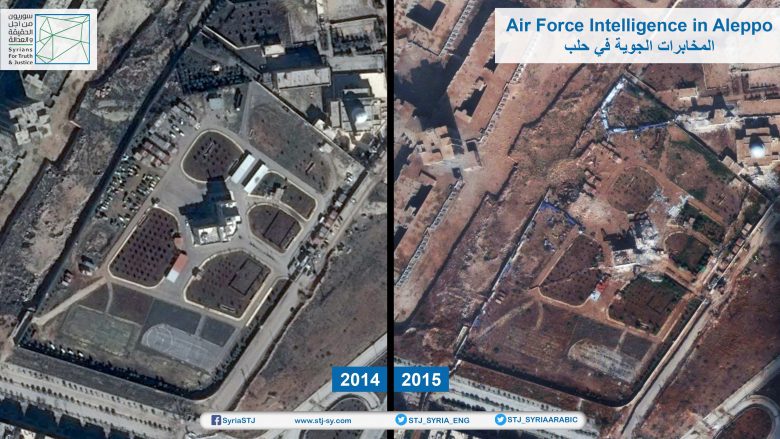
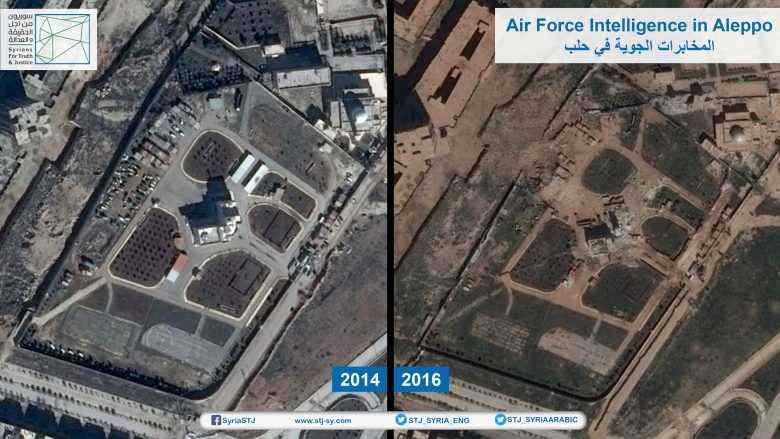
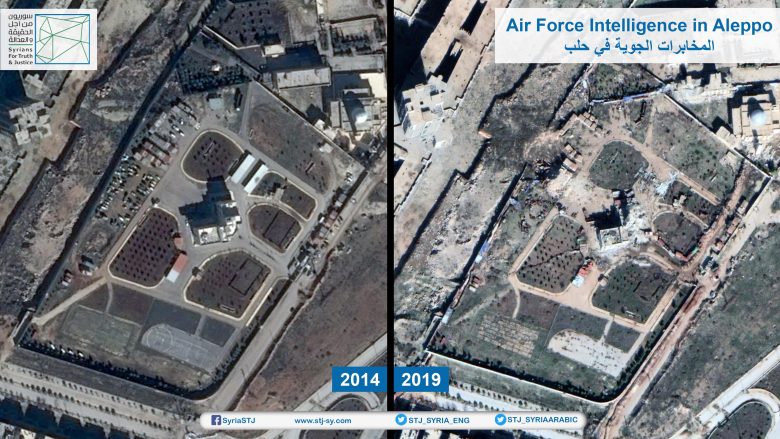
4. Unimaginable Psychological Torture in the Air Force Intelligence Branch in al-Mazzeh Neighborhood:
Once “Nizar” and his friends arrived in the Air Force Intelligence Branch in al-Mazzeh Neighborhood, Damascus city, they were welcomed with a brutal beating for more than an hour. And then, they were held captive in a small cell, however, bigger than the one they were detained in before. In the new cell, they spent about four months, through which they were subjected to all forms of torture. Commenting on this, “Nizar” said:
“Here, it is necessary that I single out the styles of torture and how they vary from one security branch to the other. When I was detained at the Air Force Intelligence Branch in al-Zahraa neighborhood, Aleppo, for example, the torture was extremely brutal and physical, rather than psychological. Torture was a daily thing, ranging from Shabeh[2], electric shocks to beating by a cane or sewer pipes. One day, a militant nicknamed ‘Abou Duraid’ got in the cell, dragged me on the floor and threw me out of it. This incident happened before the battle, where the opposition armed groups tried to take over the branch. He, then, started beating me with a hollow steel pipe, which he clothed in a plastic pipe. Never stopping for a breath, he beat me mercilessly, as if I have committed a crime of some sort. This is not to mention the electric shock which we were subjected to now and then and the Shabeh that often lasted for three consecutive days. There was also Bisat al-Rih/Flying Carpet[3], Shabeh on a chair, and many other harsh physical torture means. I recall that one of the persons, detained with me, developed a kidney-related illness due to the violent beating he was subjected to; the head of another, however, was wounded while he was hit by an iron tool. At the Air Force Intelligence Branch in al-Mazzeh, the torture can be better described as psychological. For instance, if one of us felt the need to go to the toilet, he should have waited for other four detainees to demand going to the restroom, after which a militant would lead us naked there, granting us one minute to finish; all of us, for we divided the time among us, 10 seconds each. To guarantee that we do not take much time in the toilet, the militant would beat the detainee next in line, for it is sure that the detainee already in the toilet would try to finish as soon as possible because his friend is being beaten and tortured outside. Of the other methods of torture, adopted at the al-Mazzeh branch, was deprivation of water and food; sometimes the detainees were denied food and water for long durations.”
5. “We Darted Out Thrilled and Overcome by Joy”:
On July 27, 2014, “Nizar,” accompanied by other five detainees, was transferred to the Adra Central Prison/Rural Damascus. A batch of the remaining detainees, however, was transported to the Sednaya Military Prison; another batch stayed in the hold of the Air Force Intelligence Branch in al-Mazzeh neighborhood. According to “Nizar, the situation was better at Adra Central Prison, compared to the security branches, where he spent an additional 10 months, up to November 10, 2016. Having spent this time, a militant approached him and informed him that he and his friend “M. Q.” should meet the Judge of the Terrorism Court, who is to inform them of their release’ date. He added:
“I and a friend of mine from the city of Kafr Nabl, also a resident of the house from where we have been arrested, were [summoned]. Going there, the judge broke out a piece of news that shook our balance out with happiness. With his local accent, he said ‘get ready, you will be released.’ I almost did not believe what he said, for today the shackles will be broken and the darkness will withdraw. I will be seeing the world once again and return to my family after all. We traced our way back to the cell, packing overjoyed and ready to go out on the same day. The to be released detainees from all the prison’s cells were brought together, about 10 detainees; my friend and I, with others from different areas and provinces. We waited till the matters were organized. We were released. Thrilled and overcome by joy, we darted to the prison’s main gate. Unfortunately, our joy was incomplete, for upon reaching the gate, we were surprised with a military vehicle there. The personnel boarding the car inquired about who ordered our release. Without a word, they led us to the car and returned us to the Air Force Intelligence in al-Mazzeh for the second time. They placed us in solitary detention, after informing us that we will stay there as war hostages until a day comes and the opposition armed groups exchange us for the Syrian regular forces they hold as prisoners. At the time, I was traumatized and disappointed. We remained there for almost a year and eight months.”
6. “I Haven’t Breathed Freedom until 20 Million Syrian Pounds were Paid”:
Late in 2018, “Nizar” was released after many intermediaries tried to interfere when he paid a sum of about 20 million Syrian pounds to the Administration of Air Force Intelligence in Damascus city. Even though “Nizar” is born to a financially modest family, his parents sold the land and the shop they owned, while they borrowed money from relatives to meet the amount demanded by the Administration through a middleman. It is worth mentioning that his friend M. Q. as well had to pay the same amount for his freedom.
“We were let out at night and headed to Syria’s north, to my city Kafr Nabl in particular. Though happy about my release and managing to stay alive after being in the presence of death, I was miserable at heart, for my future was lost with my university education, not to mention the poverty that became my family’s and my dearest companion after they paid this massive amount of money. Today, however, I am trying to adapt to my new condition. I am not sure if I am to continue my education, or whether it is a job that I will be seeking, for jobs are also a rare commodity in this area. In the end, I hope that the rest of my friends be released from prison, for none of them is guilty and have all been arrested for no reason at all.”
——-
[1] In April 2014, the Harakat Ahrar al-Sham al-Islamiyya/Ahrar al-Sham and the Hayat Tahrir al-Sham/HTS embarked on a military operation to control the Air Force Intelligence Branch, located in the Jama’aiyat al-Zahraa neighborhood in Aleppo city. However, their attempt failed.
[2] The victim is hung by manacled wrists, or from a hook or over a door, or occasionally by the feet, often for long periods and usually beaten; sometimes in a stress position where the detainee must keep his toes on the floor, as defined by Amnesty in its publication called: ‘I wanted to die’: Syria’s torture survivors speak out. First published in 2012. For further information refer to: https://www.amnesty.nl/content/uploads/2016/12/2012_03_13_syria_-_torture_report_final_with_pictures.pdf?x45368.
[3] Whereby the victim is strapped face-up onto a foldable wooden board, the two ends of which are moved towards each other causing significant pain to the lower back; during the process, the victim is beaten as defined by Amnesty in its publication called: ‘I wanted to die’: Syria’s torture survivors speak out. First published in 2012. For further information refer to: https://www.amnesty.nl/content/uploads/2016/12/2012_03_13_syria_-_torture_report_final_with_pictures.pdf?x45368.

